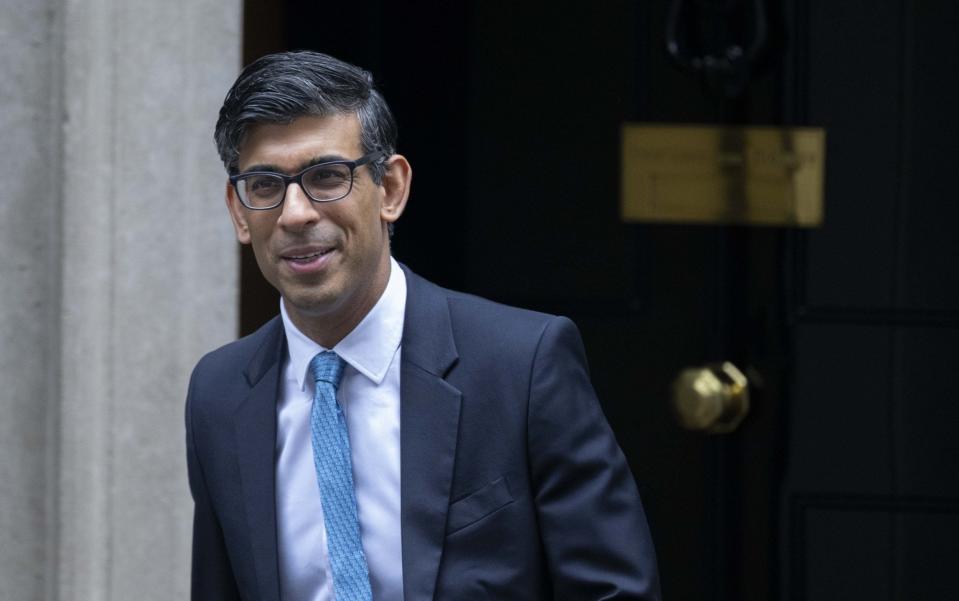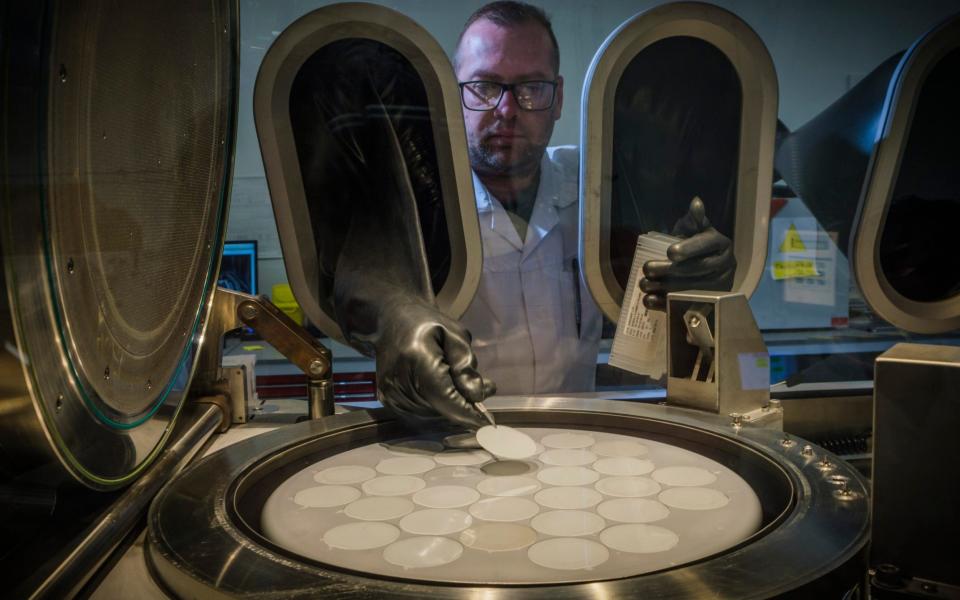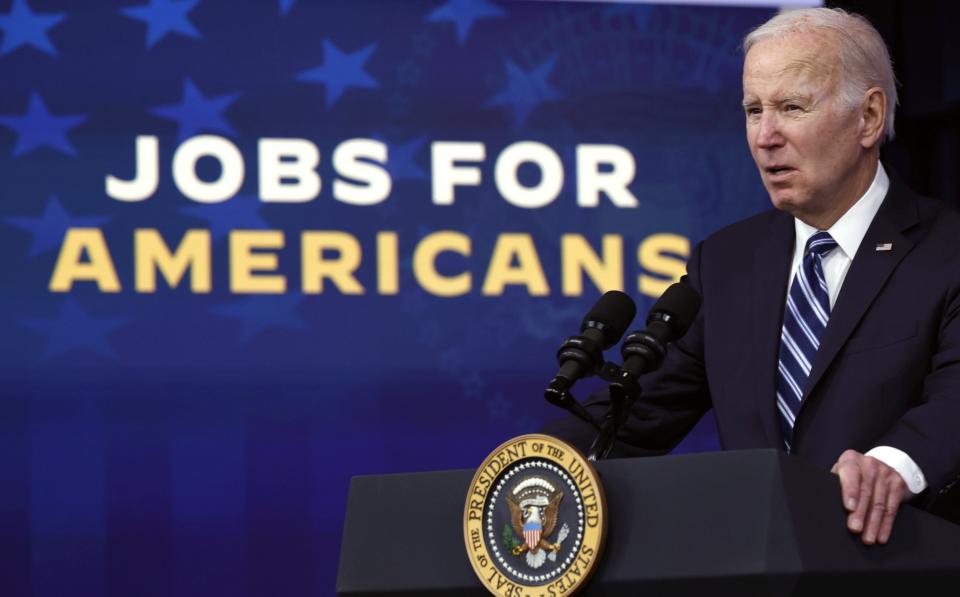Britain’s semiconductor champions could conquer the world, if Sunak grasps the nettle

Paragraf is the sort of gold dust company that Britain vitally needs if it is to sustain an advanced semiconductor industry, and if it is to avoid getting crushed in the arms race for global chip ascendancy.
A spinoff from the Materials Science Department at Cambridge, Paragraf is the world’s first and only manufacturer of 2D graphene chips for sensors. These chips are one-atom thick. They are a thousand times faster than silicon wafers used today, and they use 10,000 times less energy to do the job.
The Chinese are spending $80 billion trying to crack this technology – so far to no avail – aware that the first country to make these next-generation chips at scale will dominate clean-tech, bio-tech, and artificial intelligence for decades. It will gain the edge in precision weapons.
Paragraf has a plant in Huntingdon. Demand is so intense that it is now searching for a much bigger site with the infrastructure and skills pool for the big league. Speed is of the essence. “Right now I’m afraid we’re going to have to go elsewhere,” said Simon Thomas, the company’s chief executive.
It is the same story from Newport-based IQE, the world’s leading producer of compound epitaxy wafers for photonics. Chief executive Americo Lemos has threatened to decamp altogether unless the Government comes up with a viable semiconductor plan in short order.
Dr Thomas described the British political class as technologically primitive, with scant understanding of how semiconductors underpin the 21st Century economy or what it takes to nurture the ecosystem behind it. One official suggested that he outsource the work to Malaysia.
It took six months for Paragraf to obtain a work visa for a German specialist, and nine months for an Indian. “You want to cry: these are highly-skilled people. There are never enough visas, and it is expensive for us, and expensive for them. The Government is throttling how quickly we can grow.” he said.
He has had to build an electricity sub-station because the public infrastructure is inadequate. Don’t get him started on the stone-age planning system.
“I am passionate about trying to grow the business in the UK. If we invested in the next generation of graphene, silicon carbide, and diamond technologies, we could own the world market in fifteen years. We have the IP, and nobody else in the world has it. But we can’t expand without the necessary support,” he said.

Paragraf is eyeing America, where Joe Biden’s $52bn Chips Act is raining money, and full-service tech-parks are rolling out the red carpet. They even scout talent for you.
Tech-leaders penned a cri de coeur to the Prime Minister last month, warning that “Britain’s status as a leading tech ecosystem is at risk” with every month that the paralysis drags on.
This has a familiar ring. The silicon chip was invented in Manchester in the 1950s, yet America and Japan ran away with the prize, before Taiwan Semiconductor Manufacturing Company (TSMC) outflanked them all. The UK then pioneered the first compound chips in the 1980s but let much of the manufacturing slip away to Asia. “We missed the boat again,” said Dr Thomas
So what should we hope for when the Sunak strategy finally emerges in March? The UK certainly should not chase the chimaera of ‘semiconductor sovereignty’.
It should eschew the EU’s ruinous attempt to match Asia in advanced silicon chips. It is 40pc cheaper to produce these wafers in Taiwan due to lower labour and power costs, and TSMC is light-years ahead on miniaturisation. Nor should the UK copy the EU in trying to induce Intel to build production ‘fabs’ in Europe at €20bn a shot – half in subsidy.
The EU made a mess of its farm and fisheries policies, its energy policy, its digital policy, and its currency. We can be sure that it will make a mess of its French-driven bid to turn Europe into a semiconductor fortress, purportedly doubling its global chip share to 20pc by 2030.
The Commission has unveiled a €43 billion plan, of which just €3.3bn of actually comes from EU funds, and that is mostly from cannibalising Horizon Europe (science) and Digital Europe. It is a drop in the bucket. “We calculate that they would need €500bn,” said Kurt Sievers, head of the Dutch chip-maker NXP.
The EU is spreading itself too thin and risks a subsidy haemorrhage on yesterday’s technology. It is akin to the Chirac-Kohl bet on HD television in the 1990s, the last gasp of the analogue age.
The UK has two crown jewels: advanced compound wafers and chip design. Over 95pc of the processors in the world’s smartphones are designed by ARM in Cambridge. This is where the country has critical mass and the greatest hope of world-beating clusters.
The US, the EU, China, and Japan are all pursuing superconductor sovereignty to varying degrees. It is nigh inevitable that this will lead to a cyclical glut in the end, with much wasted money along the way. Britain should leave this impetuous scramble to others.
“We can’t do everything. We should stick to what we are fundamentally good at and where we have a global competitive advantage,” said Andy Sellars from CSA Catapult, which researches compound chips in Newport.

Generally, I oppose picking winners and losers, but semiconductors are sui generis. It is a reasonable bet that modest sums of taxpayer money deployed quickly and with panache could turn the UK into a pocket superpower in the fastest growing segment of the chip market.
The Government should not be shy about taking equity stakes. The Taiwanese state co-funded the launch of TSMC in 1987 and turned the venture into a national endeavour, backed by an heroic push for STEM education (Science, Technology, Engineering, Maths). Today TSMC makes 86pc of the world’s advanced silicon chips.
“The Government could easily copy what Taiwan did," said Dr Thomas from Paragraf. IQE's Mr Lemos made the same argument in testimony to Parliament.
The Centre for Policy Studies says Westminster should get the foundations right, offering R&D tax credits and ‘full expensing’ for plant and machinery, backed by a strategic investment fund for emerging technologies.
It should expand its ‘high potential’ visa scheme to all advanced STEM graduates from a wide range of universities in allied countries, and eliminate the needless friction of visa and health surcharge fees.
The CPS says the Government should use its power under the Levelling Up Bill to ride herd over the planning bureaucracy, giving laboratories and hi-tech sites supremacy in the order of priorities. Nobody should have to go through the deranged ordeal inflicted on the Wellcome Sanger Institute when it tried to put up a temporary genome sequencing lab at its Cambridge site during the white heat of Covid.
Rishi Sunak is tech-savvy from his Stanford days. He has liberated semiconductors from their captivity in ‘digital, media, culture, and sport’, of all places, and put them under a new Science, Innovation, and Technology Department where they belong.
His chip strategy may prove a welcome surprise. If it is not, this country would be better off with a pro-business Labour government.

 Yahoo Sports
Yahoo Sports 